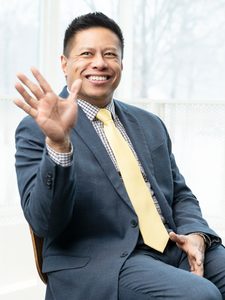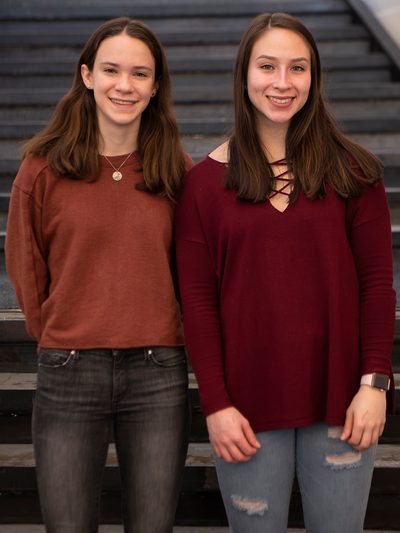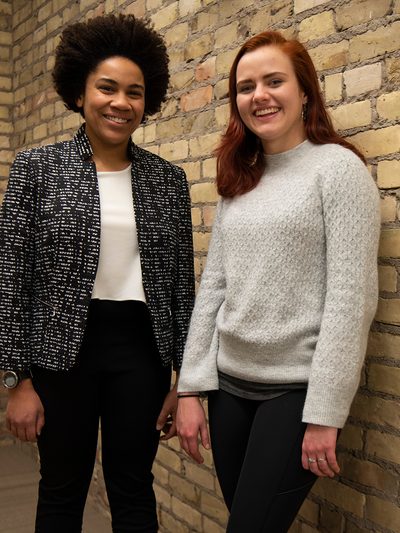
Carleton students who sign up for externships during winter break get an up-close snapshot of life on the job.
Insight born of firsthand experience. That’s the goal of Carleton’s 11-year-old externship program, which placed 253 students at over 150 different worksites around the country during the 2018‑2019 winter break.
Unlike formal internships, which are usually more time-intensive and task-oriented, these three-week tours are more akin to an extended, high-octane field trip. The workplace sponsors, who are often Carleton alumni and parents, allow students to hang out in their office spaces and shadow different employees; they also facilitate informational meetings, encourage networking, and assign related projects.
“Externships are a great way for young people to get a taste of a variety of industries and professions they might not have otherwise thought of exploring,” says Career Center director RJ Holmes-Leopold. “It puts them in a better position to decide next steps. Maybe that’s a summer internship or more directed Scholars Program. Or maybe they find out they’d like to pursue another path altogether. Whatever the case, the program does a great job of connecting students with mentors in the wider community who can provide both guidance and encouragement.”
This past winter we visited with a variety of externs during the final week of their respective appointments at the Minnesota State Capitol, the Community Planning and Economic Development Department in Minneapolis, and the international cyber security firm Crowdstrike. Their enthusiasm and gratitude for lessons learned proved both edifying and infectiously palpable.
EDITORS NOTE: Wendy Erickson ’21, Jared Margolis ’21, and Katherine Rigney ’20, who had externships at the Minnesota State Capitol with lobbyist Jim Erickson, are featured in the most recent issue of Inside Carleton.
Beyond the Numbers

Data analysis suffers from a variety of outdated stereotypes. Number crunchers are often portrayed as solitary, even lonely laborers. Statistics are assumed to be as dry as they are soulless. But as Helen Schuda ’20 and Jen Fonder ’20 learned during their externship with the City of Minneapolis’s Community Planning and Economic Development Department (CPED), reliable facts and figures are not only necessary to plan budgets and provide services, they fuel citizen engagement and passionate debate.
Schuda, an economics major who has already done an internship for the City of Colorado Springs, chose CPED because she’s interested in pursuing some sort of government work after graduation. And while Fonder, a Minneapolis native and political science major, is not specifically drawn to economics, she’s long been fascinated by issues involving affordable housing and sustainability, particularly in her hometown. Both of them expected to spend time scrutinizing data sets during their stint —which they did, using sophisticated modeling software—but neither of them imagined they’d be front-and-center for a series of essential public policy discussions.
“We went to all sorts of different committee meetings, which all had a different subject: housing, public works, the Ways and Means Committee,” says Schuda. “I’m sure the City Council members were like, ‘Who are these people coming to all of our meetings.”
Despite it being the holidays, which can make for empty halls and half-staffed offices, City Hall was hopping in early December. In particular, there were consequential discussions around Minneapolis 2040, a proposed plan for regional growth overseen by the Metropolitan Council, and an especially contentious City Council meeting concerning a makeshift homeless encampment along Hiawatha Avenue in south Minneapolis.
“When projects were discussed within CPED and at the various meetings we attended, particular attention was paid to how real people would be impacted,” says Fonder, who is planning on pursuing a master’s degree in tribal administration and government. “And I’ve learned how those realities can encourage sustainable policies that benefit the greatest number of people.”
Schuda concurs, adding that working in a city department proved the perfect way to see how politics can and must play out practically: “It seems like with the City Council there is a lot of idealism. And idealism is good. When it gets into the departments, though, they have to think more about the day-to-day implications of what they’re doing. They’re still idealistic, but they are aware of all the processes that have to happen for something to actually change.”
Miles Mercer ’98, a business manager at CPED, has sponsored Carleton externs four times over the last five years. He says liberal arts students are particularly well-suited for the opportunity because policy work rewards those with a multi-disciplinary background and an ability to think critically. He also believes the short-term nature of the appointments allow for a uniquely wide-ranging experience.
“I’m happy for them to work on projects in the office,” he says. “But because this is an externship, where they have a little more freedom to explore, I’m also happy for them to get distracted by something they see on the city’s internal website and say, ‘Oh, what is this about.’ It’s just a really great way for young people to learn what they’re interested in or maybe not interested in. And it can help inform the choices they will have to make, from summer internships to their post college years.”
Safe and Secure

Computer science major Anna Johnson ’19 has long been fascinated with how outside forces can turn computers against their users. “When you’re doing software engineering, you might not want to think about how things can break or be broken, but you have to,” she says. “That’s the only way to figure out what can be accounted for, what can be fixed, and what has to be avoided.”
During her sophomore year, Johnson says she took a class in computer security and, near the end of the semester, was impressed by guest speakers David Diehl ’91 and Marielle Foster ’16, who had come to talk about their work with Crowdstrike, an international cybersecurity firm with offices in downtown Minneapolis. “They left me with such a good impression that when I heard they had an externship available I knew it would be really interesting,” she says.
Javin White ’20 is also a computer science major. Cybersecurity was on her radar, of course, but she wasn’t particularly drawn to subjects like endpoint security, threat intelligence, and incident response—all part of Crowdstrike’s portfolio. “I didn’t fully appreciate how many different ways a system could be corrupted,” she explains. “My externship made me understand how people were attacking systems and stealing data. And that’s something I will definitely keep in mind when I write things.”
Neither White nor Johnson is entirely sure whether or not they’ll pursue a career in cybersecurity. After their externships, however—which involved completing a data-gathering project and working alongside staff members in Crowdstrike’s intimate office space—they both became enamored with the work culture.
“It’s a really great office environment. People are obviously very hardworking and get their work done, but they also value having a balanced life,” Johnson explains. “They don’t expect that this job is going to be the only thing in your life. For example, one person I’ve gotten to know says that at 9 p.m. on work nights she turns her notifications off and goes to bed. You come to the office and work, but you’re not expected to burn yourself out. To do your best work you need to take care of yourself.”
“It honestly reminds me a lot of Carleton in that way,” White says. “The best people are the friendliest people. They are kind. They are helpful. And they are open.”
